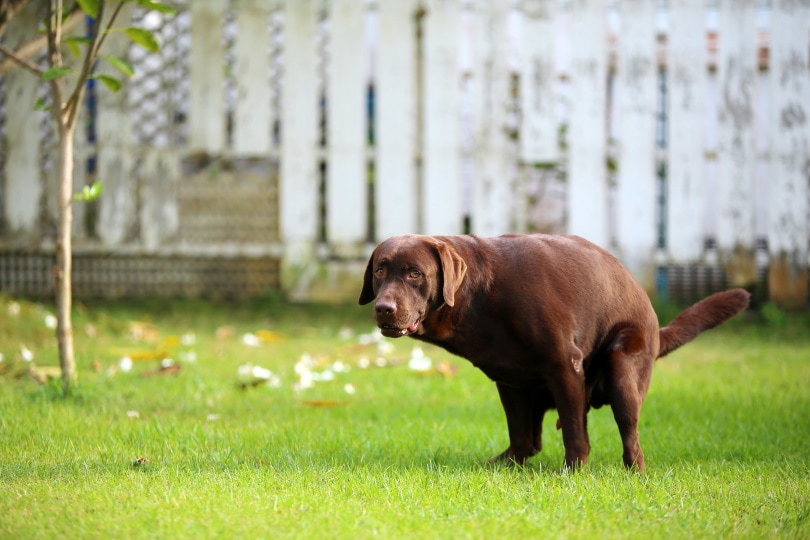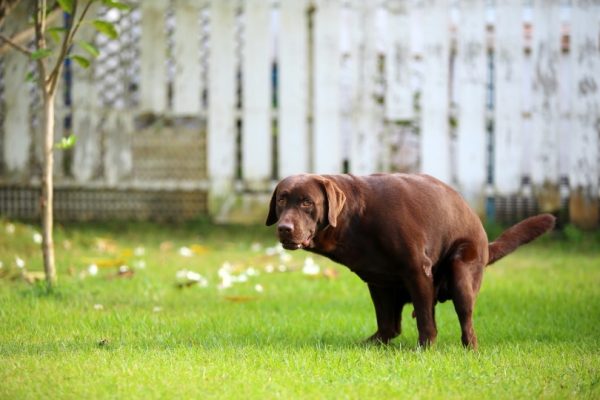As gross as it may sound, your dog’s poop can tell you a lot about its health. Healthy dog stools should be moist and solid. You shouldn’t have any issues picking it up. At some point though, you may notice your dog’s poop looking less healthy than usual.
Some people notice that their dog’s stool is dry, crumbly, or powdery. Dry, crumbly dog poop is a sign of constipation, dehydration, or blockage.
A dog becomes constipated for different reasons. Your dog may simply need more water or fiber. But there are other causes of constipation and blockage that you should address right away.
We’re going to take a look at 12 potential causes and share how you can help your dog.
The 12 Reasons Why Your Dogs Poop Is Dry & Powdery
1. Dehydration
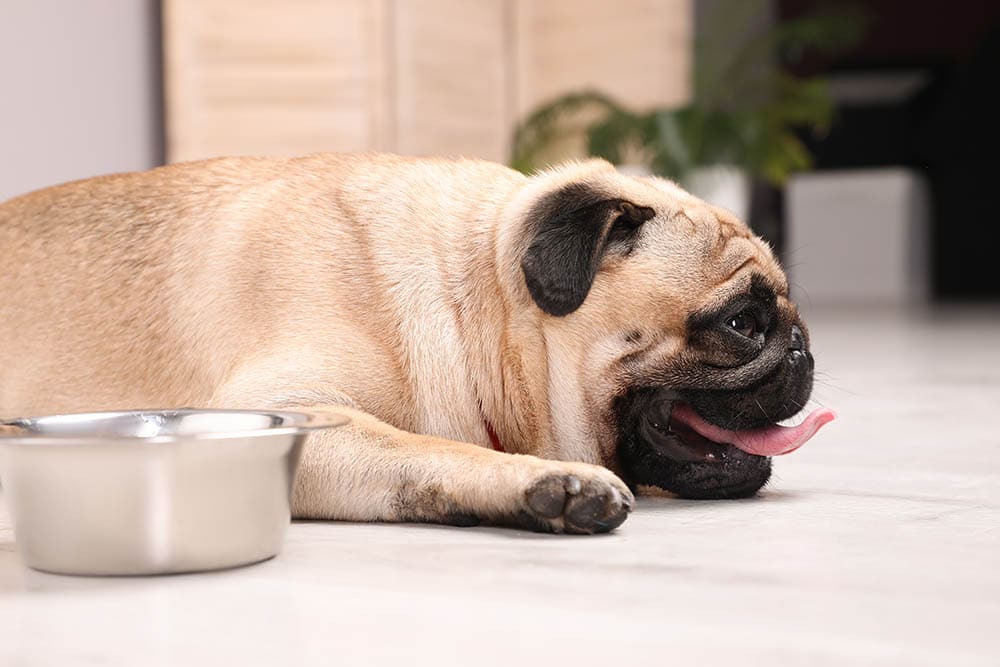
Dehydration is when a dog loses more water than it consumes. Dehydration is the most common reason why dogs have dry and powdery poop. Water helps lubricate the digestive tract and keeps your colon smooth and flexible. It gives the intestines an extra push to help “get things moving.” Without water, dogs won’t have regular bowel movements.
Like humans, dogs need to drink water daily, or they experience medical concerns that can turn into serious issues.
- Offer water in small amounts. Sometimes dogs drink too much water too fast and vomit. You can leave small amounts of water in bowls throughout the house to encourage water consumption.
- If you notice your dog is not drinking water, you need to contact your veterinarian. There could be something else making your dog sick.
2. Too Much or Not Enough Fiber
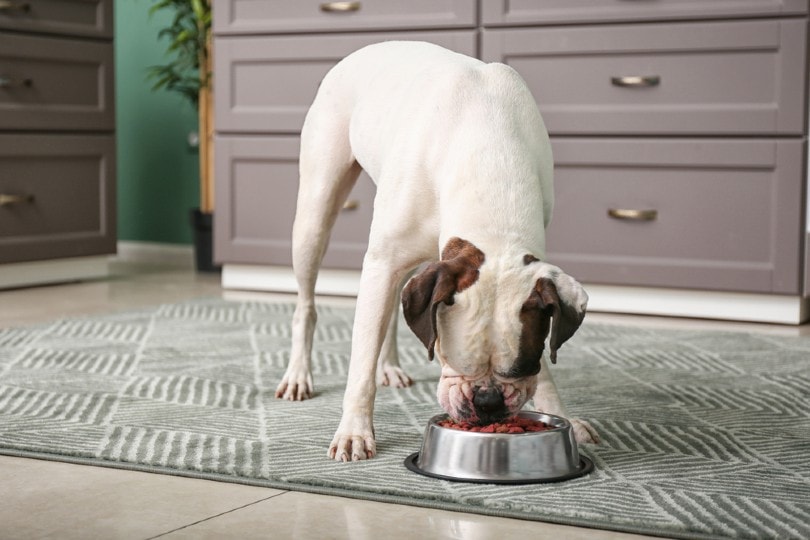
We don’t often think about our dog’s fiber intake. But if your dog has dry, crumbly stool, it may be the time to start thinking about it.
Fiber is a carbohydrate that passes through the body partially digested or undigested.
Fiber can help the body function in many ways. One of those ways is by providing nutrients to bacteria that live in the lower intestine. Different types of fiber fall into the category of soluble fiber or insoluble fiber. Your dog needs both.
- The key for your dog is to get the right amount and the right kind of fiber. It’s hard to determine what kind of fiber is in commercial pet food. Many list fiber as “crude fiber” and don’t differentiate between soluble and insoluble. Ideally, selecting pet food with ingredients like psyllium husk, oats, barley, beet pulp, guar gum, and pectins can help.
3. Collected Hair In Stool
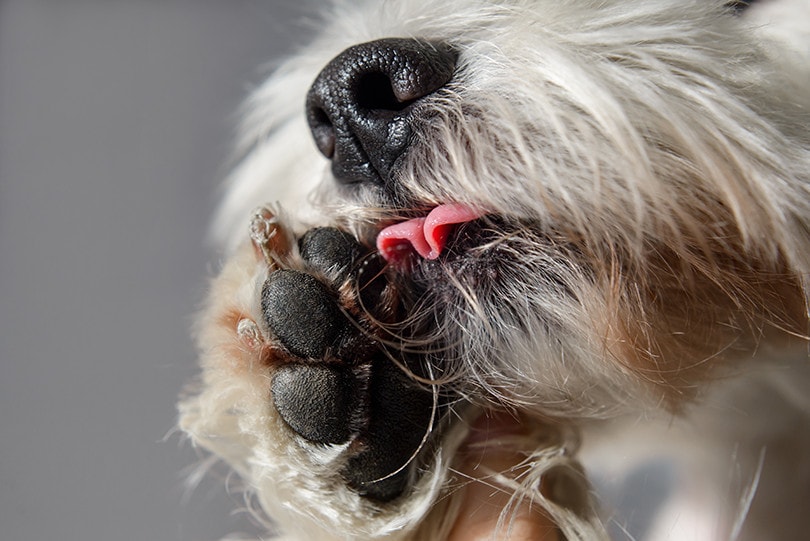
Dogs who excessively groom or lick themselves may have too much hair in their stool. This could be the case for longhaired dogs like Collies, Shih Tzus, and English Setters. Hair is difficult to digest and can build up in a dog’s colon over time. This collection of hair can cause constipation, resulting in dry stool that may have clumps of hair in it or appear dry and crumbly.
- Help your dog with grooming by brushing them daily and bathing regularly. The kind of brush you use makes a difference. Try using the Furminator or a traditional metal comb for long-haired dogs needing deep brushing. A professional groomer can help with deep cleansing baths, de-shedding, and thorough brushing.
4. Matted Hair and Feces
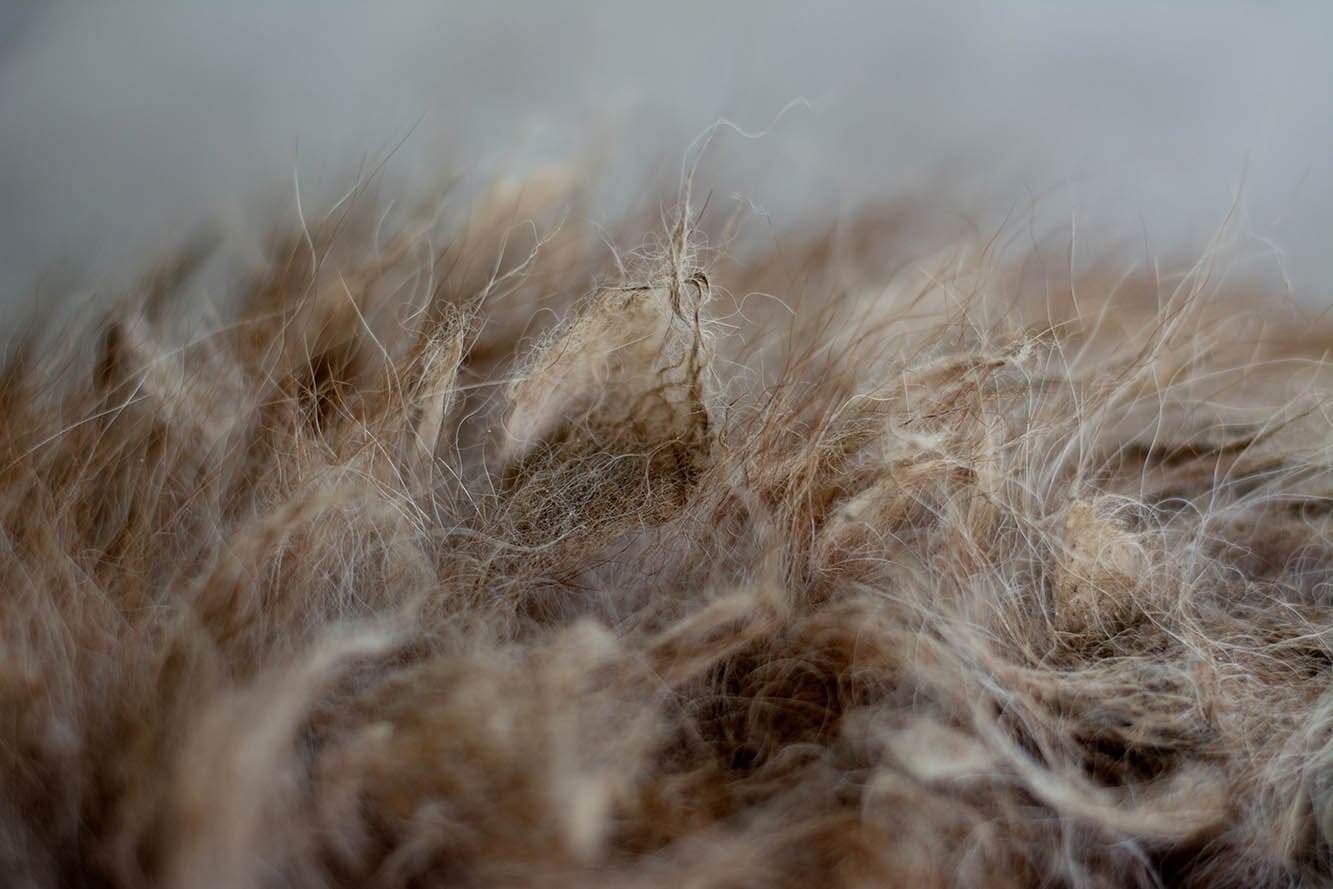
Matted hair and feces around the dog’s backside result from poor grooming. Sometimes if a dog has prolonged diarrhea, feces can build up around the anus and cause a blockage. The clinical term for this is called pseudocoprostasis.
Over time, it can become difficult for a dog to defecate if a collection of dried feces and fur block the exit. Longhaired dogs especially can develop this issue. Dogs suffering from hypothyroidism who shed a lot can also develop pseudocoprostasis.
- Groom your dog’s backside carefully with dog clippers. You’ll need to gently bathe the area with warm water and dog shampoo and carefully pat dry. If your dog is experiencing chronic diarrhea, call your veterinarian to help determine what treatments may be needed.
5. Eating Non-Food Related Items
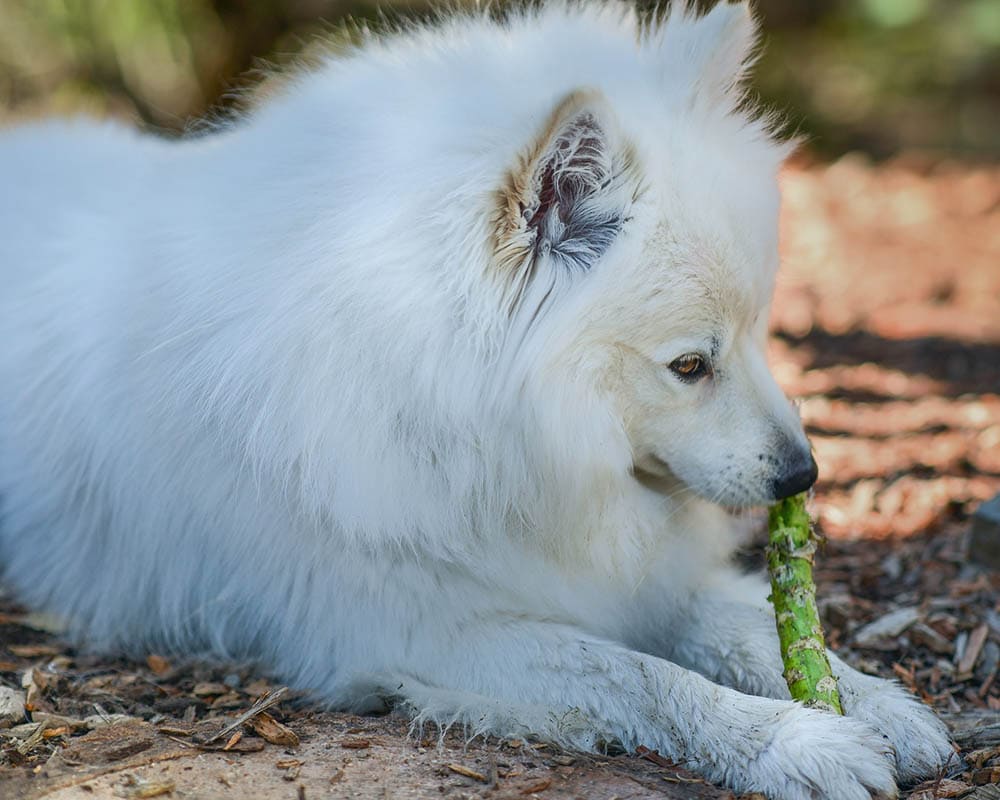
As dog owners, we know that some dogs eat anything and everything. It’s normal dog behavior. But it can be detrimental if they eat the wrong thing. One of the most common causes of constipation is a dog eating a foreign object, like plastic or dry bone. Foreign objects are not easily digested and result in blockage. Overall, blockage leads to other health concerns and must be addressed immediately.
- A veterinarian must diagnose a blockage with radiographs, abdominal ultrasounds, and some blood work. Treatment varies depending on the degree of blockage. Some cases require fluids and meds, and others require surgery.
6. Not Enough Exercise
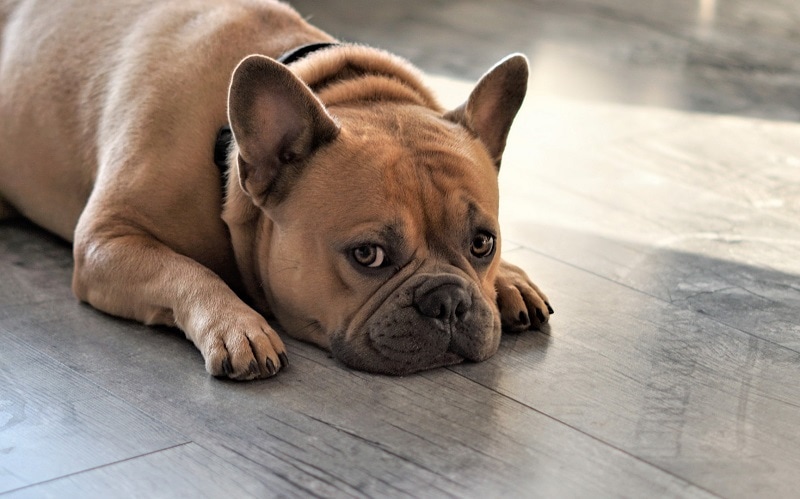
Exercise gets the blood pumping and the GI tract moving, and dogs are no exception. A sedentary dog could experience dry and crumbly stools if he’s not moving and drinking enough water.
- Regular walks and play sessions with your dog encourage movement and help them have better bowel movements. More activity results in more water intake, helping your dog stay hydrated and lean.
7. Medications
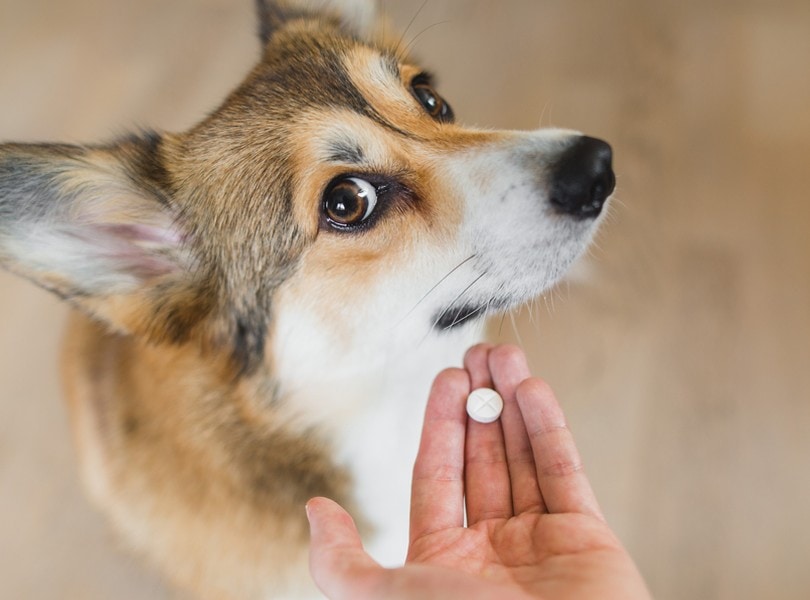
A medication may be causing your dog to have dry and powdery stools. Medicines can have side effects, and some may cause constipation. Drugs like antihistamines, opioids, and diuretics have constipation as a possible side effect.
- If you have concerns regarding a prescription your dog is taking, contact your veterinarian to discuss if a change is needed.
8. Enlarged Prostate
The prostate is a small reproductive gland located above the bladder, just below the colon. Intact male dogs could experience an enlarged prostate at some point, which is a reason why veterinarians recommend neutering your dog.
An enlarged prostate puts pressure on the colon, making it difficult for a dog to defecate. This can result in constipation.
- Different diseases affect the prostate, so treatment varies based on a dog’s symptoms. Typically, a dog with prostatic disease has difficulty urinating. Still, if your dog is intact and you notice possible constipation, you need to have your dog examined.
9. Orthopedic Issues
Dogs are very active creatures and sometimes hurt themselves in the process of running, playing with other dogs, or playing with their owners. Some dog breeds are prone to orthopedic issues, and some dogs may have come from a bad breeding situation.
Orthopedic problems can involve hip dysplasia, ligament tears, luxating patellas, and arthritis. Pain can discourage a dog from getting up to use the bathroom, resulting in constipation or elimination around inappropriate areas.
- Treatment varies based on the type of orthopedic diagnosis. Some orthopedic issues can be handled with pain medication and others require surgery. The only way to know for sure is to have your veterinarian examine your dog and create a treatment plan.
10. Pelvic and Spinal Issues
Dogs that have experienced pelvic and spinal injuries are prone to bowel movement changes. When a dog experiences pelvic or spinal trauma such as a slipped disc or old age, it can cause gastrointestinal dysfunction. The pain alone can cause a dog not to use the bathroom.
- If you suspect your dog is experiencing pelvic discomfort, you need to have your dog examined as soon as possible. Typical signs of pain may include your dog defecating in abnormal areas because it can’t walk to its usual spot. Your veterinarian may want to perform radiographs to determine the cause of the issue.
11. Anal Gland Issues
Anal glands are two glands located inside the anus that help lubricate the dog’s stool and release pheromones to communicate with other animals. The liquid inside these sacs express naturally when a dog defecates. However, dogs experience anal gland issues like impaction or infection when things are awry.
Infected anal glands can become swollen, making it difficult for a dog to pass stool. This inevitably leads to constipation and dry stool.
- Some dogs have recurring anal gland issues, particularly small breeds. Anal gland issues range from mild to severe. Regardless, they serve an important function and shouldn’t be ignored. Regular anal gland expressions from your veterinarian can help prevent infection or impaction.
12. Neurologic Issues
Not many people realize that neurologic issues can play a role in how their dog defecates. What it comes down to is how the nerves in the GI tract are responding to signals. Dogs have sensory neurons and motor neurons that carry information and responses from the brain to other parts of the body. When dogs experience neurologic dysfunction, basic abilities like defecation and urination can be affected.
Dogs with neurologic issues and spinal injuries typically have problems with bowel movements. Spinal injuries can affect the spinal nervous system resulting in fecal incontinence or retention. In either case, it’s common to see wet stool instead of dry stool.
- Neurologic issues vary greatly and so does treatment. Ultimately, your veterinarian will have to create a treatment plan best for your dog’s situation.

Final Thoughts
Although it is gross to talk about our dogs’ poop, we gain a lot of information about its health just through observation. If you suspect your dog has a more serious condition linked to its dry stool, call your veterinarian to schedule an examination. They can help determine the root cause and get your pooch the help it needs.
For most dogs, dry, crumbly, or powdery stool is an irregular problem that can be fixed with hydration, a simple change in diet, and plenty of exercise.
See Also:
- Why Does My Dog Walk and Poop? 11 Vet-Reviewed Reasons
- How to Keep Floors Clean With Dogs: 7 Tips (With Pictures)
Featured Image Credit: Wasitt Hemwarapornchai, Shutterstock
Contents
- The 12 Reasons Why Your Dogs Poop Is Dry & Powdery
- 1. Dehydration
- 2. Too Much or Not Enough Fiber
- 3. Collected Hair In Stool
- 4. Matted Hair and Feces
- 5. Eating Non-Food Related Items
- 6. Not Enough Exercise
- 7. Medications
- 8. Enlarged Prostate
- 9. Orthopedic Issues
- 10. Pelvic and Spinal Issues
- 11. Anal Gland Issues
- 12. Neurologic Issues
- Final Thoughts

